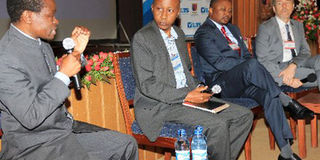WAWERU: Let’s master English and tell our story

From left, Kenya School of Law CEO P.L.O. Lumumba, John Kageche, Learning and Testing Services CEO Kuda Nhiwatiwa and Education Testing Services executive director for strategy and business growth Gerben Van Lent in a panel discussion at a conference on English and communication at Strathmore University on May 19, 2016. The conference aimed to come up with standards of English certification. PHOTO | JEFF ANGOTE | NATION MEDIA GROUP
What you need to know:
- Kenya has stories to tell that are unique and important. The sooner we as writers can embrace English as our own language, the sooner our stories will be told.
Nodding while listening to someone speak is a common sign of agreement or understanding during a conversation. It is also true that it can be an indication that communication is not happening.
You may have observed a person whose command of the English language is not good nod continually and comically when in a conversation with a native speaker. Not understanding fully what is being said, they overcompensate by nodding and agreeing continually.
The incessant nodding communicates the wrong message — it makes the person appear subservient and without an opinion. They may have a lot to say, but in a classic case of communication breakdown, only a one-sided conversation takes place.
Is English important for Kenya and Kenyans? Why does it matter whether we have a command of the language that many consider to be our colonisers’, one that we often state “came by ship” and is therefore not ours?
We know that Swahili and our local languages matter because they are part of our identity. Mostly, they roll off our tongues better and allow us to be ourselves. What about English? Can we just throw it to the winds once and be done with it?
Strathmore University recently hosted a conference on English for effective communication. I consider this an excellent time to ponder the importance of English in communication from the perspective of a publisher and lover of books.
English is the most commonly spoken language in the world. While there are more native speakers of Mandarin, English is spoken by a much more diverse segment of the world’s population. Therefore, writing in English enables one to communicate to a more diverse audience than any other language in the world.
Yet many of us struggle with the language, which we feel is borrowed. Little wonder then that the results of the English composition exam were the worst of all the subjects in the KCPE exams last year, with a mean score of 41.38 per cent.
Who owns the English language? The British may seem to be the obvious owners. Yet English was first brought to Britain by Germanic tribes in the fifth century. This original language has changed so much that no modern-day English speaker would recognise.
All may rightly lay claim to the English language. English is the most powerful communication tool and, therefore, a real asset to all who use it. If we write in our local languages, we will communicate with thousands of people. In Swahili we may communicate with millions of people, most of them in our region and continent. But writing in English, we have the potential to communicate with more than 1.5 billion people globally.
Books are the means by which we travel, without ever leaving our homes, and understand the world. Books are the means by which we listen to the world — to the perspectives of others and widen our own. Books are a remarkable opportunity to speak to the world and make ourselves understood.
It has been said, perhaps too often, that we do not have a reading culture, that Kenyans do not read, do not buy books. We certainly do not have a writing culture. We are unlikely to achieve a writing culture without a reading culture, and we are unlikely to achieve either unless we can find our voice.
I believe that we shall only find our voice when we own the language we write in and become confident in it. Until we own the language, our writing will be stilted, pretentious.
How can we own English? First we must master the language, then we must make it our own. We are at a distinct advantage. The average Kenyan speaks two or three languages. Because we are multilingual, we have the ability to use language in interesting and creative ways.
With regard to writing English, it has been said that you have to learn the rules first before you can break them. An excellent example is Chinua Achebe’s short story, "A Civil Peace".
Jonathan Iwegbu, the protagonist, is happy to have come through the civil war “with five inestimable blessings—his head, his wife Maria’s head, and the heads of three out of their four children”. This and other eventualities lead him to the conclusion that “nothing puzzles God”!
The use of English here is so tangibly flavourful, it is obviously a story crafted by a master of the language who has earned the right to spice it up.
Kenya has stories to tell that are unique and important. The sooner we as writers can embrace English as our own language, the sooner our stories will be told.
Mr Waweru is CEO of WordAlive Publishers; [email protected].




